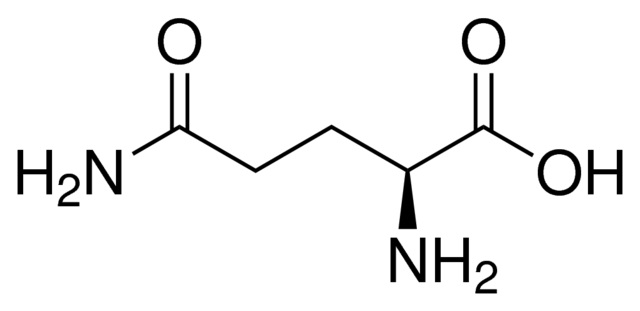Benefits of Glutamine
Do You REALLY Need It?
Choosing the right supplements can be difficult, especially when there are so many false claims in the bodybuilding world. At Muscular Strength we would like to not only debunk myths, but help guide you to make the right decisions for your body and your wallet!
Glutamine is the most abundant amino acid in your body and has numerous functions. Since we are talking about gains, you should know that about 60% of your skeletal muscle is made of glutamine.

Glutamine
Now glutamine is claimed to have a lot of amazing benefits, but today we are going to discuss what is true and what is just exaggerated hype.
It is a fact that your levels of glutamine decrease when your body goes through stress and stress could mean anything from trauma, surgery, anxiety or even intense physical exercise. When this happens, your body can take glutamine from your muscles causing catabolism and result in you losing the gains you worked so hard for!
It is also believed that, since your immune cells needs glutamine to function, you could weaken your immune system when you exercise heavily causing you to get sick more often.
It is also worth mentioning that low glutamine levels have been associated with overtraining and that glutamine is a big provider of nitrogen for your muscle tissue.
Since nitrogen is what you use from the protein you eat to internally synthesize amino acids needed for muscle growth, glutamine is very important for gains.
When you look at all the important roles of glutamine in your body, it’s pretty easy to see why all these great claims are being made.
What Are The Claims?
Glutamine is claimed to have the following benefits:
- Helps your body secrete more human growth hormone (HGH) which is ultra-important for gains and fat burning.
- Helps with immune system function
- Prevents muscle breakdown
- Promotes protein synthesis (muscle growth)
Now, after reading and researching countless articles and studies and using glutamine for a while myself, here is what I have to say about these claims.
Helps Your Body Secrete More Human Growth Hormone.
I don’t believe this simply because, just like testosterone, you would have to create a massive increase in HGH to see a difference in your gains. Also, studies have shown temporary increases in HGH but did not prove that they last. As a consumer you should be skeptical of natural supplements that claim to increase hormone levels. Most of the time, if they increase anything at all, it is most likely that you were already on the low end of the normal range to begin with. So technically, yes you may see an “increase”, but you are still within the normal range.
Helps With Immune System Function.
When it comes to glutamine helping your immune system, I believe that the benefits only apply if you have had a serious injury or trauma or if you are a hardcore endurance athlete like a marathon runner for example. Studies have shown that these athletes do have fewer infections when taking glutamine. For moderate athletes, glutamine levels in your blood do not get low enough after exercise to impair the function of your immune cells. So if you are just the average athlete looking for something to boost your immune system, glutamine most likely will not make a difference.

Prevents Muscle Breakdown
I believe this claim to be true and it is the number one reason why I take glutamine. However, if you do some of your own research you will find several mixed reviews about this. Some studies show no difference at all in muscle catabolism and some show a clear preservation of lean mass with glutamine supplementation. There are also studies on HIV patients that show that glutamine has made a significant difference on muscle wasting.
All in all, glutamine is an amino acid which is a building block of your muscles and if you can make sure that you have plenty of what you need as insurance, you should do it if it fits your budget. If you have a diet rich with foods that contain glutamine, you should be ok without the supplement. However, if I am doing anything that would cause me to be depleted or to be in a stressful situation, I would take glutamine.
Some examples would be if you are in a caloric deficit because you are trying to lose weight, you are an endurance athlete that does prolonged exercise, you suffered an injury or trauma, you are cutting for a specific reason, you do intermittent fasting or you are fasting for religious reasons.
In these cases, glutamine could be very beneficial to your gains.
Are There Side Effects To Taking Glutamine?
In terms of side effects, studies show that there are no significant issues at doses up to about 30g a day, so taking it will not hurt you.
Promotes Protein Synthesis (Muscle Growth)
Glutamine increases cell hydration and volume which is very important for muscle growth. This is because low cell volume is believed to inhibit the mTOR pathway which is an important muscle growth mechanism.
As far as dosage goes, 15 grams per day is average. Take doses of 5 mg at time. One when you wake up and one before and one after you exercise to help with cell hydration and to boost glutamine at the time of most stress. But you can obviously adjust this based on your needs.
Keep in mind that the transport of glutamine in your body is sodium dependent, so if you are cutting sodium from your diet this would be useless. Also, the bioavailability of powder or capsule glutamine is about 30% so you are actually getting much less in your system than you are taking.
The bottom line is if you are concerned with muscle wasting, you should make glutamine part of your stash as insurance to not lose your gains. But if you are looking to get any of the other benefits we about, if is more likely that they are myths built up by hype within the body building community without any science behind them to prove anything.
If you want to make sure you are getting glutamine from your diet some foods that contain glutamine are: beef, pork, chicken, milk, ricotta cheese, cottage cheese, raw spinach and yogurt.
If you would like more detail on this topic, you can check out the links to the studies I below.
One last thing, remember that you should always consult a nutritionist to discuss your specific needs! Be sure to comment below bout which supplement you would like a review about next!
SOURCES:
http://www.ncbi.nlm.nih.gov/pubmed/19885855
http://www.ncbi.nlm.nih.gov/pubmed/18806122
http://www.ncbi.nlm.nih.gov/pubmed/11822473
http://www.ncbi.nlm.nih.gov/pubmed/26545503









